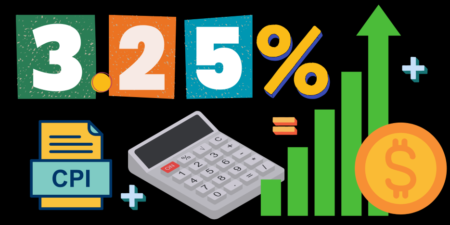Looking for info on the September 2024 pension increase? You can find information here.
Half-yearly pension indexation
The Pensioner and Beneficiary Living Cost Index (PBLCI) for the 6 months leading up to June has been published by the Australian Bureau of Statistics, and it is sitting at 3.25 per cent.
As we reported recently, the June 2023 Consumer Price Index (CPI) increase was 2.2 per cent.
Services Australia compares the CPI and the PBLCI, then applies whichever is higher to figure out how much the basic pension will go up – so, on September 20 you can expect the basic pension to be 3.25 per cent higher.
What does this mean?
For singles, the basic pension will go up to $1,003.01. The pension supplement will be $80.14, and the energy supplement will remain at $14.10. This means that the total single pension will be $1,097.25, an increase of $33.25.
For couples, the basic pension will go up to $1,512.10. The pension supplement will be $120.82, and the energy supplement will remain the same at $21.20. The total pension for couples will be $1,654.12, which is $50.12 more than the current rate.
How do they work that out?
The PBLCI was introduced in 2009 and reflects prices for things people on a pension or other government benefit are more likely to spend their money on. For example, it does not include the cost of buying a new home.
Changes to the cost of groceries and healthcare will make the PBLCI go up more than they do for CPI, as pensioners spend more of their money on these things – but CPI goes up more when education costs rise.
There is also a third figure that can affect pension rates, based on wage increases. This is the Male Total Average Weekly Earnings (MTAWE) – where the new basic pension rate for couples does not match up to 42 per cent of the current MTAWE, it is increased again to match this figure. The individual rate would be increased by roughly half of this amount.
For this to happen, there would need to be a big gap between average weekly earnings and the pension rate, but this has not affected the pension since 2009.
As CPSA said in a recent article on this topic, “MTAWE is currently doing even worse than the NSW Blues in State of Origin”.
Other changes
The pension supplement will go up 2.2 per cent, in line with the June 2023 CPI increase.
Changes to rent assistance payments are also based on CPI, though there are calls for this to change due to the housing affordability crisis.
- In April this year, Anglicare Australia released a report that found that only 0.4 per cent of rentals were affordable for people on a pension. 0 per cent were affordable for people on the JobSeeker Payment. Look out for an article on that topic from us soon, because it’s too big of an issue to cover here.
The energy supplement will not be indexed at all, though applications for NSW energy rebates have opened for the 2023-34 financial year.
- These rebates are different for embedded network customers whose electricity is supplied by an intermediary instead of mainstream energy providers such as AGL or Energy Australia, which we discuss in more detail here.
- For more details please see the Service NSW concessions and rebates page, or give them a call on 13 17 88.
- If you live outside of NSW, please see the Federal Government’s Energy Bill Relief Fund page for information on what is available and where to apply in your state or territory.
What about JobSeeker?
As we know, not everyone on a JobSeeker Payment is able to work, especially now that the Age Pension age has risen to 67, and the Disability Support Pension continues to be difficult to get for many.
Jobseeker will be increased by 2.2 per cent, in line with CPI. There will also be an extra $40 a fortnight added on top of this, as announced in the 2023-24 Federal Budget.
A single person over 60 (who has been on an income payment for more than 9 months continuously) will currently receive a maximum payment of $745.10. This will go up to $801.50 – an extra $56 a fortnight.
Will the next increase be higher?
The rate of inflation is dropping off. This likely means that pension increases next year will be smaller. The good news is, that also means that prices will not be going up as much as they have been.
